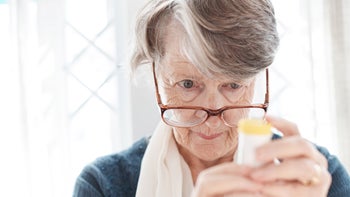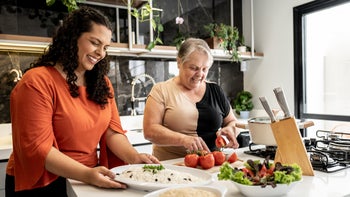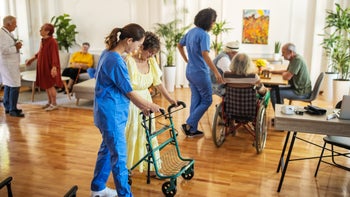
8 Proven Tips for Aging Gracefully
Key takeaways:
Aging gracefully involves taking practical steps to prevent health risks, stay independent, and enjoy your life.
Expert-backed tips for healthy aging include eating whole foods, exercising regularly, and practicing mindfulness to manage stress.
These healthy habits can lower the risk of age-related diseases like heart disease, depression, and Alzheimer's disease.

You might think you have little control over how you age. Many factors, after all, affect aging. Genetics is one of them.
But while you can't change your genes, you can change your habits. And that may go a long way toward keeping you healthy as you age, says Michael Roizen, MD. He’s the chief wellness officer emeritus at Cleveland Clinic in Ohio and author and founder of the Great Age Reboot program.
That's good news, especially when you consider that people around the world are living longer. Aging gracefully –– by prioritizing your physical and mental wellness –– can put you on a path to a longer, fuller life.
Take charge of your health
Centrum 50+ Multivitamins are clinically proven to support memory as you age*


*This statement has not been evaluated by the Food and Drug Administration. This product is not intended to diagnose, treat, cure or prevent any disease.
What does it mean to age gracefully?
Responses will vary because there isn't an agreed-upon definition of aging gracefully. So how does an aging expert answer this question? "I see it more as spending time acting as a genetic engineer for your health and engaging in your passions," Roizen says.
That means doing what you can to minimize health risks and stay independent as long as possible. It also means enriching your life with the people and things you love to maintain your mental and emotional well-being.
Although certain challenges come with getting older, there are also unique benefits, like more wisdom and free time to spend with family or pursue hobbies. Some research shows that older adults can manage their emotions better than younger peers. And a positive outlook on life may even help you live longer.
So the focus should be on practical steps to look and feel your best at every stage of your life.
Healthy tips to help you age gracefully
There are numerous strategies you can follow to promote healthy aging and longevity. Consider these eight tips to take charge of your well-being as you age.
1. Protect your skin
As the largest organ in your body, your skin has a critical job as a barrier against environmental stressors like the sun. But over time, the sun may damage your skin in big ways, including increasing your skin cancer risk.
Read more like this
Explore these related articles, suggested for readers like you.
And it can cause skin changes like wrinkles and fine lines, says Ellen Turner, MD, dermatologist and owner of Dermatology Office in Dallas. You might notice signs like sun spots, dryness, and rough or uneven texture. According to one study, harmful UV rays from the sun are responsible for 80% of facial skin aging.
To take care of your skin:
Wear sunscreen every day: Find a broad-spectrum sunscreen with SPF 30 or higher to protect your skin from the sun. Apply it to all exposed areas, like your face, neck, chest, arms, and hands. And wear protective clothing when you're outdoors.
Apply sunscreen when you're outside and indoors: You can still be exposed to UV rays through windows, Turner says. So use sunscreen whether it's sunny or cloudy, and even if you plan to stay inside. Re-up every 2 hours while outside.
Create a skincare regimen: Focus on a simple routine –– including a cleanser, moisturizer, and sunscreen –– that you can stick with. Choose products based on your skin type and concerns. For example, ingredients like retinol or vitamin C can help with fine lines.
2. Move your body every day
Physical activity is critical for your health at every age. "Strength exercise and aerobic exercise lower your risk for heart disease, diabetes, and high cholesterol," says Carol Espel, MSC, PT, fitness director at Pritikin Longevity Center in Miami.
Experts recommend that older adults include these four types of exercise in their weekly fitness routine:
Aerobics: 150 minutes of moderate-intensity aerobics, such as brisk walking, cycling, or playing pickleball
Strength training: 2 muscle-building workouts like lifting weights, using resistance bands, or doing bodyweight exercises
Balance training: 3 days of balance exercises like tai chi
Flexibility exercises: 2 to 3 days of flexibility exercises like yoga or stretching
If you're unsure where to begin, start small with 10 minutes of daily exercise. Then, gradually increase your workout time. According to one study, adding 11 minutes of daily moderate exercise may reduce the risk of premature death.
These suggestions can encourage you to move your body every day:
Schedule short workouts throughout the day.
Exercise at the same time every day.
Find an accountability partner to join your workouts.
Try counting steps.
Set reminders to get up and move for a few minutes every half hour.
3. Eat more whole foods
A healthy, nutrient-rich diet can add years to your life. That means getting back to the basics with more whole foods, including:
Fruits and vegetables
Whole grains
Healthy fats
Lean or plant-based protein
"Plant-based foods have hundreds of compounds called phytochemicals, or phytonutrients," says Nichole Dandrea-Russert, MS, RDN, an author and dietitian who runs Purely Planted, a website on plant-based wellness. "They come with a myriad of benefits like brain health, skin health, gut health, and more."
They're also packed with fiber, which has been linked to lower rates of heart disease, Type 2 diabetes, and colorectal cancer.
Focusing on plant-based foods –– like fruits, vegetables, beans, and nuts –– doesn't mean you have to give up meat or dairy altogether. Instead, you introduce more plant-based options to your diet. And try to cut back on processed foods –– such as deli meat, soda, and packaged sweets –– that may be linked to a shorter lifespan.
It's never too late to start making dietary changes for healthy aging. Research shows that swapping processed foods for healthier alternatives can increase your life expectancy, even in middle age. But the sooner you start, the better.
4. Log more — and better quality –– sleep
Adults should aim for 7 to 9 hours of sleep every night. But according to the CDC, 1 in 3 adults don't get enough sleep. And how well you sleep is just as important as how long you sleep.
Without enough quality sleep, your health can suffer, Roizen says. You might be more irritable, tired, or have trouble maintaining your balance the next day. Poor or inadequate sleep can make you more prone to colds. It can also increase the likelihood of age-related health concerns like Alzheimer's disease and depression. This is important because older adults may have difficulty falling or staying asleep.
Try these and other sleep hygiene tips for more restful sleep:
Go to bed and wake up at the same time every day.
Turn off your screens at least 1 hour before bed.
Avoid caffeine, alcohol, and large meals before bed.
Try not to nap after 2PM and keep naps under 30 minutes.
Create a relaxing nighttime routine by listening to music, reading a book, or doing a few yoga poses.
5. Keep stress in check
Chronic stress can harm your body and mind, causing symptoms like headaches, muscle pain, and mood changes. The toll on your health may lower life expectancy and satisfaction.
No one can avoid stress entirely. It's a normal response to life's challenges. But you can improve how you react to stress. "By managing stress, you can prevent its effect on your rate of aging," Roizen says.
Prioritize your mental health by finding healthy ways to cope with stress and boost your mood. Examples include:
Practice mindfulness with meditation, yoga, or tai chi.
Take regular nature walks.
Practice gratitude by journaling or writing letters.
6. Prioritize your social connections
Human connection is more important than ever, as many people report feeling lonely. And older adults are especially vulnerable to loneliness and social isolation.
Building or maintaining relationships with friends and family offers mental, emotional, and physical health benefits, such as:
Better mood, stress management, self-esteem, and life satisfaction
Lower risk of depression
Higher likelihood of recovery from serious stress
Increased longevity
It can be challenging to connect with others, especially as you age. These methods can help combat loneliness and keep you connected with others:
Plan visits with friends or loved ones.
Volunteer with an organization you care about.
Sign up for a group fitness class.
7. Nurture your curiosity
Nurturing curiosity isn't just for kids. Curiosity is the desire to learn new information or have new experiences. It may help adults cope with everyday stress and uncertainty. And it's been linked to healthy aging for older adults, with benefits such as improved memory.
You can spark curiosity by:
Reading often and asking questions
Traveling to new places
Trying new hobbies or returning to an old one
8. Get regular checkups
There's a misconception that you only need to see a doctor when you're sick. With routine checkups, your provider can keep you up to date with preventative health screenings and vaccinations. They may spot early signs of disease that are easier to treat.
How often you visit your doctor depends on your health status, age, and sex. In general, though, you should get an annual physical exam, Roizen says. And stop by the eye doctor for an exam every 1 to 2 years.
Visit your dentist 1 to 2 times a year and floss daily to prevent periodontal disease. Bacteria in your mouth can travel into your bloodstream. As a result, you could be at greater risk for conditions like dementia, heart attack, and stroke, he says.
The bottom line
Aging gracefully may mean something slightly different to each person. But at its core, healthy aging is about prioritizing your physical and mental health. Proven strategies –– like exercising regularly, wearing sunscreen, and nurturing your relationships –– can help you stay healthy and enjoy your life as you age.
Why trust our experts?



References
Centers for Disease Control and Prevention. (2016). 1 in 3 adults don’t get enough sleep.
Centers for Disease Control and Prevention. (2021). Physical activity for different groups.
Centers for Disease Control and Prevention. (2023). How does social connectedness affect health?
Colberg, S. R., et al. (2016). Physical activity/exercise and diabetes: A position statement of the American Diabetes Association. Diabetes Care.
DiLoreto, R., et al. (2017). The cell biology of aging. MBoC: Molecular Biology of the Cell.
Drake, A., et al. (2021). Daily stressor-related negative mood and its associations with flourishing and daily curiosity. Journal of Happiness Studies.
Galli, G., et al. (2017). Learning facts during aging: The benefits of curiosity. Experimental Aging Research.
Garcia, L., et al. (2023). Non-occupational physical activity and risk of cardiovascular disease, cancer and mortality outcomes: A dose–response meta-analysis of large prospective studies. British Journal of Sports Medicine.
Härkänen, T., et al. (2020). Estimating expected life-years and risk factor associations with mortality in Finland: Cohort study. BMJ Open.
Holt-Lunstad, J., et al. (2015). Loneliness and social isolation as risk factors for mortality: A meta-analytic review. Perspectives on Psychological Science.
Hunter, M. R., et al. (2019). Urban nature experiences reduce stress in the context of daily life based on salivary biomarkers. Frontiers in Psychology.
Huxhold, O., et al. (2014). Benefits of having friends in older ages: Differential effects of informal social activities on well-being in middle-aged and older adults. The Journals of Gerontology: Series B.
Koga, H. K., et al. (2022). Optimism, lifestyle, and longevity in a racially diverse cohort of women. Journal of the American Geriatrics Society.
Lantrip, C., et al. (2017). Cognitive control of emotion in older adults: A review. Clinical Psychiatry.
Li, J., et al. (2017). Sleep in normal aging. Sleep Medicine Clinics.
Li, Y., et al. (2019). The impact of healthy lifestyle factors on life expectancies in the US population. Circulation.
Liss, D. T., et al. (2021). General health checks in adult primary care: A review. Journal of the American Medical Association.
MedlinePlus. (2022). Health screenings for men age 65 and older.
MedlinePlus. (2023). Skin layers.
Milas, G., et al. (2021). The impact of stress and coping strategies on life satisfaction in a national sample of adolescents: A structural equation modelling approach. Stress Health: Journal of the International Society for the Investigation of Stress.
Moser, C., et al. (2011). Self-perception of aging and vulnerability to adverse outcomes at the age of 65–70 years. The Journal of Gerontology: Series B.
National Academies of Sciences, Engineering, and Medicine. (2020). Social isolation and loneliness in older adults: Opportunities for the health care system. The National Academies Press.
Prather, A. A., et al. (2015). Behaviorally assessed sleep and susceptibility to the common cold. Sleep.
Reynolds, A., et al. (2019). Carbohydrate quality and human health: a series of systematic reviews and meta-analyses. The Lancet.
Sakaki, M., et al. (2018). Curiosity in old age: A possible key to achieving adaptive aging. Neuroscience & Biobehavioral Reviews.
Schnabel, L., et al. (2019). Association between ultraprocessed food consumption and risk of mortality among middle-aged adults in France. JAMA Internal Medicine.
Schutte, N. S., et al. (2022). A meta-analytic investigation of the impact of curiosity-enhancing interventions. Current Psychology.
Shan, Z., et al. (2023). Healthy eating patterns and risk of total and cause-specific mortality. JAMA Internal Medicine.
Shanbhag, S., et al. (2019). Anti-aging and sunscreens: Paradigm shift in cosmetics. Advanced Pharmaceutical Bulletin.
Sotos-Prieto, M., et al. (2017). Association of changes in diet quality with total and cause-specific mortality. The New England Journal of Medicine.
Spira, A. P., et al. (2014). Impact of sleep on the risk of cognitive decline and dementia. Current Opinion in Psychiatry.
Tian, D., et al. (2019). Exercise for prevention and relief of cardiovascular disease: Prognoses, mechanisms, and approaches. Oxidative Medicine and Cellular Longevity.
Totsune, T., et al. (2021). Curiosity–tourism interaction promotes subjective wellbeing among older adults in Japan. Humanities and Social Sciences Communications.
Umemura, G. S., et al. (2022). Is balance control affected by sleep deprivation? A systematic review of the impact of sleep on the control of balance. Frontiers in Neuroscience.
Wickramaratne, P. J., et al. (2022). Social connectedness as a determinant of mental health: A scoping review. PLoS ONE.
World Health Organization. (2022). Ageing and health.





























